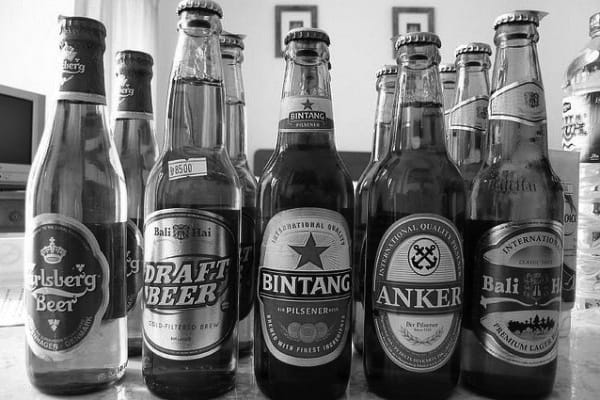The government claims that its ban on alcohol sales in convenience stores is motivated solely by a desire to protect children.
If the government really cares about the health and morals of young Indonesians, it should start enforcing existing laws, rather than creating new ones.
The removal of beer and pre-mixed alcoholic drinks from minimarts and small shops is a trifling inconvenience to me – as it merely means trekking to a supermarket next time I have to entertain any guests desirous of a beer.
What concerns me is proposed legislation by Islamic parties for a complete ban on alcohol – and jail terms for drinkers. Trying to impose exclusively Islamic values on a nation that once prided itself on its secular and inclusive state ideology, Pancasila, reeks of betrayal to the nation’s founders.
The danger of beer is not in selling it from licensed premises. The danger is in banning it, as people will turn to illicitly produced alcohol.
Hundreds, possibly thousands (there is no accurate data), of Indonesians are killed each year by home-made spirits, often tainted with methanol – a highly toxic chemical more suited for industrial applications.
Trade Minister Rachmat Gobel in January issued the decree banning the sale of drinks with between 1%–5% alcohol content from minimarts and other small shops. Sales of stronger drinks were already forbidden at such stores. The latest restrictions came into effect on April 16.
Gobel insisted the ban was necessary to protect Indonesian children from alcohol. There is already legislation for that purpose. A 2009 Trade Ministry decree states that a person must be at least 21 years old to purchase alcohol. Many minimarts had alcohol-specific fridges emblazoned with signs reminding customers of the minimum drinking age.
The penalty for selling alcohol to minors depends on the local bylaws of each region and province. For example, those violating the rules on alcohol sales in Jakarta can be jailed from 20 to 90 days, and fined from Rp.500,000 to Rp.30 million.
Proponents of the beer ban insist that minimarts have been allowing Indonesian children to get drunk, leading to rape, prostitution, theft and murder. I have spent more time than I care for in Jakarta’s minimarts, but I have never seen children buying alcohol. Cigarettes, frequently; but never alcohol. I have witnessed staff at a 7-Eleven refusing to sell beer to children.
Alcohol causes 1 out of every 100,000 deaths in Indonesia. Smoking and traffic accidents claim many more lives. Following are some measures the Government could take to protect the wellbeing of children:
1: Ban all forms of cigarette advertising,
including sponsorship of music concerts and sporting events. Tobacco-related illnesses kill about 240,000 Indonesians annually. The minimum age for smoking in Indonesia is 18 but vendors are rarely penalized for selling cigarettes to children. Most Indonesian smokers start the habit as children. According to World Health Organization data, 34.9% of Indonesians (including 66.8% of men) are smokers, whereas 0.6% are alcohol drinkers.
2: Stop children from riding motorbikes
especially those riding without helmets. Road traffic accidents kill about 32,000 Indonesians annually. Most traffic accidents involve motorbikes. Indonesia’s mandatory helmet law is often flouted by passengers – especially children. It’s common to see school kids riding motorbikes – with no license and no helmet. In 21% of motorbike accidents, drivers were unlicensed.
3: Improve the education system.
At least 20% of the state budget is allocated to education, but much of it is spent on administrative costs, rather than providing children with free textbooks. At least 17,520 schools don’t have electricity. Elementary school children are forced to rote-learn the structure of the Indonesian bureaucracy, rather than being encouraged to develop creativity and critical thinking.
4: Impound vehicles that emit dangerous levels of carbon monoxide.
Vehicle exhausts are the major source of urban air pollution, which is extremely hazardous to children because it can cause respiratory problems, cardiovascular diseases and brain damage. Old buses, orange bajajs and motorbikes belch out toxic fumes.
5: Enforce regulations that ban parking on sidewalks.
Some 21% of traffic fatalities in Indonesia are pedestrians. Every day, you can see children walking on roads because sidewalks are covered by illegally parked motorbikes and cars, and by vendors. In genuine democracies, sidewalks are for pedestrians.
6: Allocate more urban space to parks and sports fields.
If children had safe, free places to play and exercise, they would be healthier and less likely to develop anti-social habits. Indonesia should be able to rival Brazil in soccer prowess, if only it cared about providing kids with free training and places to play.
Many other measures could be taken to protect children, such as: restricting the sale of unhealthy food at schools, improving awareness of healthcare and sanitation, preventing noise-induced hearing impairment, halting mercury-based illegal gold mining, and cracking down on child labour.
Alcoholic Reprobates?
Some expats made a lot of noise – at least on social media – about the minimart alcohol ban. I wasted about 10 years of my life on heavy drinking, mostly in Indonesia. It never caused me to commit any crimes or violence. It never caused any discernible health problems, apart from when I routinely passed out drunk holding a lit cigarette in a plastic filter, which melted onto my fingers.
I rarely bought beer from minimarts. I was a social drinker, the sort who drank almost every night in the company of like-minded alcoholic losers, some seeking solace from the excruciating emptiness of existence, partly fuelled by booze. I tried a few “Are You an Alcoholic?” tests and ticked most boxes. However, an excessive fondness for beer doesn’t necessarily make someone an incurable alcoholic. I simply reduced my intake from approximately 96 standard drinks a week to about 4 a week (and quit smoking at the same time). Easy. The only negative is that I became unbearably sanctimonious.
Hardened beer drinkers, averse to wasting money on inflated pub and supermarket prices, can order Bintang beer from distributors for Rp.290,000 per crate of 16 x 620 ml bottles. That includes delivery and works out to just over Rp.18,000 a bottle – whereas cafes and bars charge about Rp.30,000 per 330ml bottle or 300ml glass, often much more. If you do start buying by the crate, you have to pay an initial deposit of Rp.2,000 per bottle and about Rp.20,000 per crate.
A Rum Do
Supermarkets must now stock alcohol behind counters or in locked cabinets. This was evident at my local supermarket last week – although I managed to find over a dozen bottles of 40% rum on a shelf, between bottles of maple syrup. When I asked why it wasn’t banned, the reply was: “It’s for making cakes, not for drinking.”
The leading proponent of alcohol restrictions is Fahira Idris (47), who founded the National Anti-Alcohol Movement in 2013. She claims that alcohol every year kills 18,000 Indonesians, most of them young people. “Imagine the fate of this nation if it is led by people contaminated by alcohol. We will become a weak nation. Indonesia could lose a generation due to alcohol.”
You can buy beer, wine and spirits at minimarts in neighbouring Singapore, which is not doing too badly as one of the world’s richest countries with its policies that encourage growth and innovation.
Fahira was accused of hypocrisy earlier this year after Tweeting against Valentine’s Day, when it was later revealed that her online florist business sold Valentine’s Day bouquets.
She recently lambasted Jakarta Governor Basuki ‘Ahok’ Tjahaja Purnama over his comment that stealing public money is a bigger sin than drinking alcohol. She said Ahok’s stance makes him clearly unsuitable to be the leader of Jakarta.
No joke. Some people favour corruption over alcohol. It’s almost enough to drive an ethical person to drink.
Also Read The Trouble With Alcohol in Indonesia




